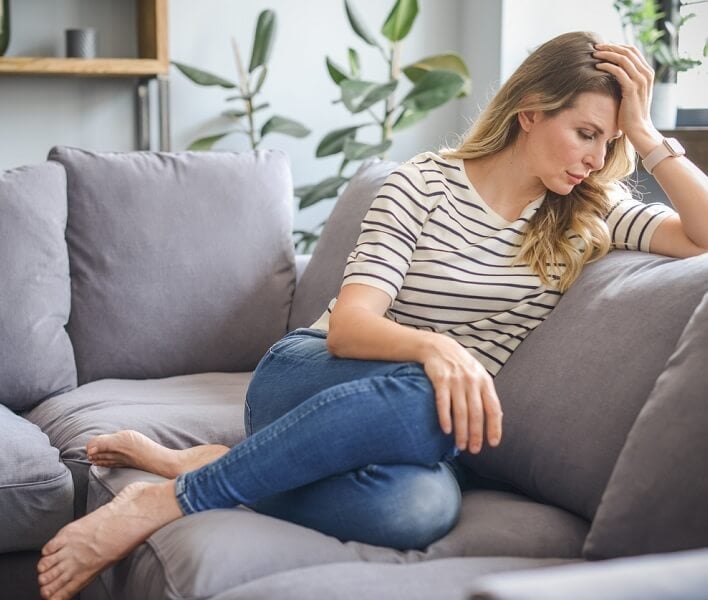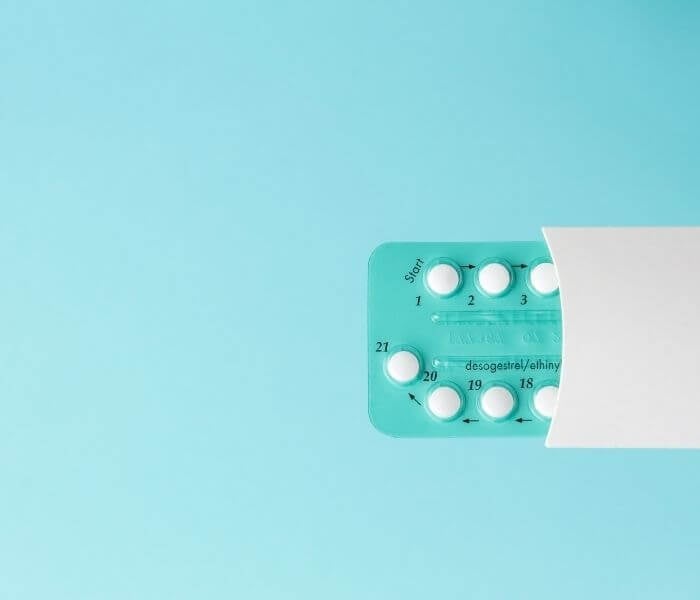3 mins read
Can Contraception Impact Sleep?

- Does Birth Control Cause Insomnia?
- Hormonal contraception can impact the type of sleep you have
- Hormonal contraception can contribute to mental health challenges
- Hormonal contraception can increase your body temperature
- Nutrient deficiencies can also impact your sleep
- What can I do if my contraception is impacting my sleep?
Good quality sleep is essential to our physical, mental and emotional well-being. Research has shown that women need more sleep than men, yet they often struggle to get consistent sleep quality because of hormonal fluctuations throughout the menstrual cycle.
So, how do factors like contraception impact our sleep?
Does Birth Control Cause Insomnia?
The key difference is between hormonal and non-hormonal contraception.
Non-hormonal contraception (such as the copper IUD and condoms) will not impact your sleep because they don’t alter your natural hormone fluctuations.
On the other hand, hormonal contraceptives protect you from pregnancy by releasing synthetic hormones to prevent ovulation.
Examples of hormonal contraception include:
- Combined pill
- Progestin-only pill
- Implant
- Injection
- IUS
- Patch
Like most women’s health topics, the relationship between hormones and sleep is understudied. However, the Journal of Sleep Research found women using hormonal contraception were more likely to suffer from both insomnia and daytime sleepiness. However, the study also found that many women using hormonal birth control experienced improved sleep quality and reduced sleep apnoea.
It’s important to remember that hormonal contraception will impact people differently depending on their natural hormone fluctuations and metabolism. But here are a few ways hormonal contraception could impact your sleep.
Hormonal contraception can impact the type of sleep you have
Sleep can be broken into two categories: rapid-eye-movement sleep (REM), and non-rapid-eye-movement sleep (Non-REM). REM sleep is lighter and more easily disturbed – this is where dreaming occurs. Non-REM sleep is deeper and necessary for cellular repair and regeneration, memory, immune regulation and hormone production.
Hormonal contraception can cause people to have more REM sleep, meaning they’re more likely to be disturbed.
Hormonal contraception can contribute to mental health challenges
Most hormonal contraceptives contain progestin – a synthetic version of progesterone that works to prevent ovulation. If you don’t ovulate, your body doesn’t naturally produce progesterone in the second half of your cycle.
Natural progesterone interacts with receptors in the brain to decrease your stress responses and calm your nervous system, whereas progestin does not. So, hormonal contraception can increase anxious feelings, leading to reduced sleep quality. This is also one of the reasons post-menopausal women often experience an increase in anxiety.
Women with a natural menstrual cycle will often notice a dip in mood in the lead-up to their period as progesterone levels are at their highest. Both progesterone and progestins increase an enzyme called monoamine oxidase (MAO). MAO breaks down neurotransmitters like serotonin and dopamine – the happy hormones. So, more progestin creates more MAO, reducing serotonin and increasing the risk of depression.
Hormonal contraception can increase your body temperature
When progesterone levels rise in the lead-up to your period, your basal body temperature rises too. The constant influx of progestin through hormonal contraception can have a similar effect on some women. Although the difference will be small, some people are sensitive to temperature changes and may struggle to sleep.
Nutrient deficiencies can also impact your sleep
Taking hormonal contraceptives consistently for over a year can cause nutrient deficiencies in b group vitamins, zinc and magnesium. All of these are essential to the production of neurotransmitters and hormones which support sleep and relaxation.
What can I do if my contraception is impacting my sleep?
If you think your contraception might be impacting your sleep, the best place to start is tracking your sleep habits. Take a look at lifestyle factors such as your sleep hygiene, diet, exercise routine and stress levels – since these can all impact your sleep too.
If you’ve made an effort to adjust these factors and are still struggling with sleep, contact your healthcare provider to discuss alternative contraceptive options.
This information has been medically reviewed by Dr Thom Phillips
Thom works in NHS general practice and has a decade of experience working in both male and female elite sport. He has a background in exercise physiology and has published research into fatigue biomarkers.

Dr Thom Phillips
Head of Clinical Services
Related articles
Like this article? Here are some more based on similar topics.



